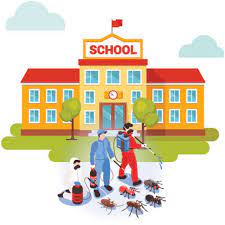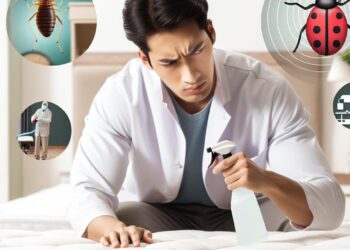“Empowering Communities Through Education: The Importance of Pest Control Education for Effective Pest Management”

Effective pest control is essential for the safety and well-being of humans and animals. Pests such as rodents, insects, and other vermin can cause damage to crops, buildings, and infrastructure, as well as spread diseases. Therefore, it is important to have measures in place to manage and control pest populations. Education plays a crucial role in promoting effective pest control by providing individuals with the knowledge and skills needed to manage pests safely and efficiently.
Education is the process of acquiring knowledge, skills, values, and attitudes that enable an individual to function effectively in society. In the context of pest control, education helps individuals understand the nature of pests, the risks associated with pest infestations, and the various methods of managing and controlling pests. Education can be delivered through various channels, including formal education, training programmes, workshops, and awareness campaigns.
Formal education is an important channel for promoting effective pest control. Schools, colleges, and universities can include pest management as a part of their curriculum to ensure that students are equipped with the knowledge and skills required to manage pests safely and effectively. For example, agricultural universities can provide courses on pest management techniques and their applications, while environmental science courses can teach students about the environmental impact of pesticides and alternative methods of pest control.
In addition to formal education, training programmes can be used to promote effective pest control. These programmes can be targeted at specific groups of people, such as farmers, pest control professionals, and homeowners. For instance, farmers can attend training programmes that teach them how to use pesticides safely and efficiently, while homeowners can learn about the various methods of pest control that they can use in their homes.
Workshops are another effective channel for promoting effective pest control. Workshops can be organized by government agencies, non-governmental organizations, and other stakeholders to provide individuals with hands-on training on pest control techniques. Workshops can be particularly useful in rural areas where access to formal education and training program’s may be limited.

Awareness campaigns can also be used to promote effective pest control. These campaigns can be targeted at the general public to raise awareness about the risks associated with pest infestations and the various methods of managing and controlling pests. For example, awareness campaigns can be used to educate the public about the importance of maintaining clean and hygienic environments to prevent pest infestations.
Education can also play a role in promoting the use of non-chemical methods of pest control. Non-chemical methods of pest control, such as biological control, physical control, and cultural control, are becoming increasingly popular due to concerns about the environmental impact of pesticides. Education can help individuals understand the benefits of non-chemical methods of pest control and how to use them effectively.
Biological control involves the use of natural predators, parasites, and pathogens to control pest populations. Physical control involves the use of physical barriers, traps, and repellents to prevent pests from entering buildings and damaging crops. Cultural control involves the use of cultural practices, such as crop rotation and sanitation, to prevent pest infestations.
Effective pest control also involves the responsible use of pesticides. Pesticides can be effective in controlling pest populations, but they can also have negative environmental and health impacts if used improperly. Education can help individuals understand the risks associated with pesticide use and how to use pesticides safely and responsibly.
Education can also play a role in promoting integrated pest management (IPM) practices. IPM is a holistic approach to pest management that involves the use of multiple pest control methods in a coordinated and systematic manner. IPM can reduce the use of pesticides and promote the use of non-chemical methods of pest control. Education can help individuals understand the principles of IPM and how to implement IPM practices effectively.
Education plays a crucial role in promoting effective pest control. Through formal education, training programmes, workshops,awareness campaigns, and the promotion of non-chemical methods of pest control, education can equip individuals with the knowledge and skills needed to manage and control pest populations safely and efficiently. By promoting responsible pesticide use, encouraging the use of non-chemical methods of pest control, and promoting integrated pest management practices, education can help protect the environment and the health of humans and animals.

Education can also help bridge the gap between researchers and practitioners in the field of pest management. Researchers can use education as a channel to share their findings with practitioners, while practitioners can provide feedback to researchers on the effectiveness of pest management strategies in the field. This collaboration can lead to the development of new and more effective pest management strategies.
Furthermore, education can empower individuals to take action in managing and controlling pest populations in their communities. By providing individuals with the knowledge and skills needed to identify and manage pest infestations, education can help prevent the spread of diseases and reduce the economic impact of pest damage.
However, it is important to note that education alone cannot solve all the challenges associated with pest control
. Education must be accompanied by effective policies, regulations, and enforcement mechanisms to ensure that individuals and businesses follow safe and responsible pest management practices. It is also important to address the underlying causes of pest infestations, such as poor sanitation and hygiene, to prevent pest infestations from occurring in the first place.
Conclusion
Education plays a crucial role in promoting effective pest control. Through formal education, training programmes, workshops, awareness campaigns, and the promotion of non-chemical methods of pest control, education can equip individuals with the knowledge and skills needed to manage and control pest populations safely and efficiently. Education can also promote responsible pesticide use, encourage the use of non-chemical methods of pest control, and promote integrated pest management practices. By working together with effective policies, regulations, and enforcement mechanisms, education can help protect the environment and the health of humans and animals, and promote sustainable pest management practices.















